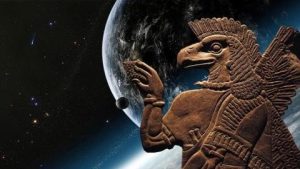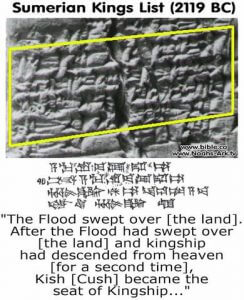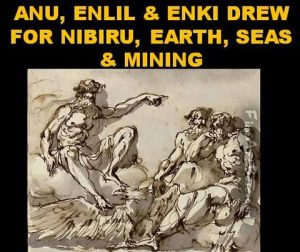
Mankind without memory: the forgotten timeline of events before and after the flood of the world
 25
25
 17. 08. 2017
17. 08. 2017

Is humanity really a biological species without memory? Is there perhaps a forgotten historical timeline of our planet, ignored by traditional historians?
According to some theories backed up by historical records, the answer to these questions is YES.
It is remarkable that many cultures around the world tell us about the time when our planet was hit by the great flood that called "the Gods" on Earth and early humans. Where did this story of the Flood of the World arise? Many do not know that the story of "The Flood of the World" (or "The Great Flood," as Annunaki called it) originates in ancient Sumer.
To understand this story, we have to go to Erida (now Abu Shahrein in Iraq), the first city founded by the Gods, and the home of the Old Church Deity named Enki. According to scientific research, this ancient city was built around 5400 BC
The old "Sumerian royal list" calls Erid "the city of the first kings," literally:
"When the kings descended from heaven, the kings dwelt in Erid."
In this ancient city was found the "History of Erida" ("Eridu Genesis"), an old-world text describing the creation of the world, the construction of all the ancient cities and the flood of the world. The "History of Erida" is dated to 2300 BC and is the oldest record of the world's flood, older than the more familiar story described in the biblical book Genesis (or First Book of Moses).
Scientists' opinions on this event are diverging. For example, Thorkild Jacobsen, in his book The Treasures of Darkness, states:
"After Nintur [Ninhursag] decided to raise humanity from the primitive nomadic camps to live in the cities, the time came when the herd was thriving and the kings came from heaven."
The oldest cities were built, named, great with units of measure and signs of a redistributive economic system, allocated to the people and divided among the Gods.
Irrigation agriculture was developed and humanity flourished and multiplied. But the noise of the tumultuous human settlements enraged Enlila, who, when he could not stand it, persuaded the other Gods to destroy mankind by a great flood.
Enki, quick thinking, figured out how to warn his favorite, a Ziusudra. He ordered him to build a boat in which he would survive the flood with his family and animal representatives. "
But what happened to Earth on the earth before a great flood swept over the planet?
According to Zecharia Sitchin, "The Cosmic Code: The Sixth Book of the Earth Chronicles," the following is the timeline of the history of our planet before and after the Great Flood:
EVENTS BEFORE POTOPOU
Before 450 000 flights
Life on Nibiru, the remote planet of our solar system, is extinguished because the atmosphere of this planet is disturbed.
The ruler of Allah, defeated by the throne of Anu, escapes to the spacecraft and finds shelter on Earth. He finds that there are gold deposits on this planet that can be used to protect the atmosphere of Nibiru.
445,000
Annunaki's leadership, Enki, the son of Anu, land on Earth and set up Erid, or the first earth station to exploit gold in the Gulf.
430 000
The earth is warming. There are other Anunnaki on Earth, including Enki's half-sister Ninhursag, chief physician.
416,000
When the amount of gold in the Gulf falls, Anu returns to the throne of Enl. They are deciding to acquire vital gold mining in South Africa. Enlil gets the command of the Earth Mission, Enki is sent to Africa. The grandson of Allah raises against the claim to the throne of Anu when he leaves Earth.
400 000
Seven functional settlements in southern Mesopotamia include the Sippar spaceport, the Nippur Mission Control Center and the Shuruppak mining center.
The gold-bearing ore is brought from Africa by sea, the dirt-free metal is dispatched to the orbit of the Igigi in orbit, from where it regularly drives the Nibir spacecraft.
380 000
Allaah's grandson is trying to seize government over the Earth with the support of the Igigi. The Enlilites win the War of Old Gods.
300 000
Anunnaki working in the mines. Enki and Ninhursag create genetic manipulation of monkeys by primitive workers who take over the manual work of Anunnaki.
Enlil sinks down mines and takes primitive workers to Edina in Mesopotamia. When they are allowed to breed, Homo Sapiens begins to multiply.
200 000
During the time the icy life on Earth stagnates.
100 000
It is warming again. Anunnaki (biblical Nephilim) - to Enlil's growing concern - to marry human beings.
75 000
The "curse of the Earth" begins - a new ice age. Regressive types of humans are spreading, of which Cro-Magnons survive.
49 000
Enki and Ninhursag raise the people's messengers with Anunnaki to the Shuruppak government. Enlil is furious and plans to destroy humanity.
13 000
When Enlil realizes that the approaching approach of Nibiru to the Earth will cause a huge tidal wave, Anunnaki will swear that the approaching calamity will not divine humanity.
EVENTS AFTER FOOD
11 000 BC
Enki violates the oath and orders Ziusudro / Neoma to build a submarine. Flood comes. The Anunnaki follow a disaster from a spaceship in orbit. Enlil agrees that tools and seeds will be distributed to the rest of humanity. Humankind begins to cultivate the highlands. Enki domesticates animals.
10 500 BC
There are three areas assigned to Noah's descendants. Enlil's first-born son, Ninurta, overthrows the valley and dries the rivers to make Mesopotamia habitable. Enki occupies the valley of the Nile.
The Sinai Peninsula retains the Anunnaki as a postdiluvial space port. On the Mount Moriah (where Jerusalem will stand) there is a control center.
9,780 BC
Ra / Marduk, the firstborn son of Enki, divides the rule over Egypt between Osiris and Seth.
9,330 BC
Seth wonders and squires Osiris; taking over the government over the entire Nile Valley.
8,970 BC
Horus defeats the death of his father Osiris by the first pyramid war. Seth goes to Asia and recharges the Sinai Peninsula and Canaan.
8,670 BC
The Enlilites proclaim the Second Pyramid War because they do not like Enki's descendants to control all space installations. Winning Ninurta takes all the equipment out of the Great Pyramid.
Ninhursag, a half-sister of Enki and Enlila, convenes a peace conference. The original division of the Earth is reaffirmed.
The government over Egypt is transferred from the Raoy / Marduk dynasty to the Thoth dynasty. As a spare space beacon, Heliopole is built.
8 500 BC
Anunnaki puts the gates to his space facilities; one of them is Jericho.
7 400 BC
Peace persists, Anunnaki helps humanity progress. The Neolithic period begins. Egypt is governed by the demigods.
3 800 BC
In Sumer, where the Anunnaki renovate the Old Cities (beginning with Eridus and Nippur), urban civilizations are emerging.
Anu visits Earth. In his honor, the new city of Uruk (Erech) is built. The Anu temple is the home of her beloved granddaughter, Inanny / lštar.
THE KINGDOM OF THE COUNTRY
3,760 BC
The king becomes human. The first settlement town of new kings becomes Kish under the auspices of Ninurta. A calendar is set up in Nippur. Civilization flourishes in Sumer (the so-called "first regions").
3,450 BC
Government over Sumer passes to Nannara / Sin. Ra / Marduk declares Babylon as the "gate of the gods" and the Anunnaki cause confusion in languages.
After a failed coup, Ra / Marduk returns to Egypt. Here he takes off Thoth's throne and is interested in his younger brother, Dumuzi, engaged to Inanna. When Dummies dies accidentally, Ra / Marduk is trapped in the Great Pyramid, flees an emergency shaft, and goes into exile.
3 100 - 3 350 n
Civilization expands into a "second region": in Egypt a period of confusion ends with the first Pharaoh's death on the throne in Memphis.
2,900 BC
The king of Sumer becomes Erech. Innana gains control over the "third region" - the Indu Valley.
2,650 BC
The capital city is shifting several times, the rule of the human kings in Sumer quits. Enlil is losing patience with unruly human crowds.
2,371 BC
Inanna falls in love with Sharru-Kina / Sargon. They set up the new capital of Agad (Akkad) - the Akkad Empire emerges.
2,316 BC
In a desire to rule the four regions, Sharru-Kin / Sargon is taking sacred ground from Babylon. Thus begins the conflict between Marduk and Innana, which ends when Marduk's brother Nergal arrives in Babylon from South Africa and convinces Marduk to leave Mesopotamia.
2,291 BC
Naram-Sin uses the Akkadian throne. Under the baton of the fierce Innany, he penetrates the Sinai peninsula and attacks Egypt.
2,255 BC
Inanna usurp the power in Mesopotamia; Naram-Sin defies Nippur. Anunnaki destroy Agad; Inanna escapes. Sumer and Akkad have units that are loyal to Enlil and Nintha.
2,220 BC
Sumerian civilization reaches new heights under the enlightened Lagas government. Thoth helps Laga's King Guda build a ziggurat temple for Ninurta.
2,193 BC
In Nippur, Terah, the father of Abraham, is born in the priest-royal family.
2 180 BC
The division of Egypt: the followers of Raa / Marduka retain Upper Egypt; Pharaohs who stood up to Marduk gain the throne of Lower Egypt.
2,130 BC
Since Enlil and Ninurta are increasingly gone, central authority is also falling in Mesopotamia. Inanna is trying to rebuild the kingdom of Ereche / Uruk.
FOURTH CENTURY
2.123 BC
Abraham is born in Nippura.
2,113 BC
Enlil entrusts the land of Shim to Nannar; the capital of the new empire becomes Ur.
Ur-Nammmu uses the throne and becomes "Nippur's Defender". Terah, a Nippurian priest, comes to Ura to make contact with the royal court.
2 096 BC
Ur Nammu dies in the battle. People regard his premature death as betraying Anua and Enlila. Terah leaves with his family to Harran.
2 095 BC
The Shulgi empire uses the throne in Uru and strengthens the interrelationships between the empires. While his empire flourishes, Shulgi is enchanted by Innana and becomes her lover. He gives the Elamit of Lars in exchange for becoming his alien legion.
2,080 BC
Thais princes, faithful to Rao / Marduk, headed by Mentuhotep I, head north. Marduk's son Nabu receives partisans for his father in West Asia.
2 055 BC
On Nannar's command, Shulgi sends elammit troops to curb riots in Canaan cities. The Elamites reach the gate of the Sinai Peninsula and the space port.
2,048 BC
Shulgi is dying. Ra / Marduk moves to the land of the Hittite. Abraham, with an elite cavalry unit, is transferred to southern Canaan.
2 047 BC
Amar-Sin (biblical Amraphel) becomes king of Uru. Abraham goes to Egypt, where he remains for five years, and from where he returns with more soldiers.
2 041 BC
Amar-Sin led by Innanou creates a coalition of the Kings of the East and launches a military expedition to Canaan and Sinai, led by Elamit Khedor-la'omer. Abraham stops their progress toward the gate and the space port.
2,038 BC
Amar-Sin is replaced by Shu-Sin on the Ur's throne, but the empire is already falling apart.
2,029 BC
Shu-Sin is replaced by Ibbi-Sin on the Throne of Throne. Western provinces are increasingly inclined to Marduk.
2,024 BC
Marduk, at the head of his followers, marched to Sumer and settled in Babylon. The struggle spreads to central Mesopotamia.
Nippur's holiest place is defeated. Enlil demands a punishment for Marduk and Nabu; Enki faces him, but his son Nergal agrees with Enlight.
When Nabu gives his Canaan supporters the command to conquer the spaceport, the Anunnaki leaders approve the use of nuclear weapons. Nergal and Ninurta destroy the space port and the guilty Canaan cities.
2,023 BC
The wind carries a radioactive cloud to Sumer. People die of terrible death, animals die, water is poisoned, land is barren. Sumer and his great civilization lay ash. Their inheritance passes on Abraham's seed when Abraham in 100 years begets a legitimate heir, Isaac.









